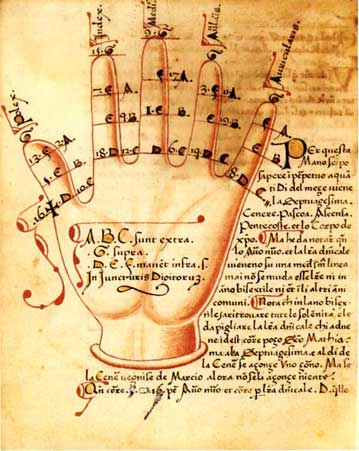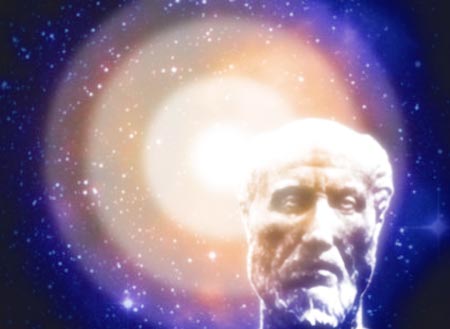The Digital Revolution: Who’s In Charge?
By Michael SigmanThe Voice of Authority
The Museum of Jurassic Technology (www.mjt.org), tucked away on a quiet street in West L.A., says more about America’s elitist, narrative-controlling Voice of Authority than a thousand protest posts from pajama-clad bloggers. First, visitors plug in to their official museum headphones and hear an all-too-familiar, portentous white male “expert” telling them what to think. But soon—perhaps when The Voice deadpans that one exhibit is an elaborate sculpture of Pope John II made from a single human hair inside the eye of a needle—it becomes clear that things aren’t what they seem, and that who’s in charge is up for grabs. (At this point, museum-goers might also realize that the museum’s name is a giveaway: the Jurassic Period came millions of years before there were humans, much less technology.)In just a few years, the technology unleashed by the digital revolution has pulverized the historical top-down narrative model and replaced it with an unimaginably vast, inchoate mass of user-generated information from some two billion interconnected people around the world. At last count, we send each other over two trillion emails a day and search the Web 14 billion times per month; there are over 125 million bloggers, 75 million Twitterers and 450 million Facebook friends. And that’s just the tip of the Internet iceberg.
Google (www.google.com) chair Eric Schmidt calls this transfer of power “the greatest experiment in anarchy that we have ever experienced.” For veteran old media publishing executive Jacob Epstein, it’s “a technological shift orders of magnitude greater than the momentous evolution from monkish scriptoria to movable type.” And for Bill Gates we’re dwelling in the “Market square of the new Global Village.” However you characterize it, what’s at stake is nothing less than who’s in charge—the elites or the masses. We’re finding out, as Leonard Cohen puts it in his song "Democracy," “who will serve and who will eat?”
Three Information Revolutions
1. Reading and writing: Massive technological change always breeds fear and resistance. 2500 years ago in Athens, Socrates, the father of Western philosophy, was so scared that reading and writing would make his fellow citizens dumb, he refused to write a word. Why would people bother to remember anything, he reasoned, when they could look it up on what was essentially humankind’s first external hard drive? Fortunately, Socrates’ star pupil, Plato, disagreed. In a series of Dialogues he preserved his mentor’s brilliance, which a mouse-click can now deliver to anyone with an Internet connection instantly and for free. http://plato-dialogues.org/links.htm2. Movable Type: Two thousand years later the Gutenberg Press, which threatened to unleash mass literacy, likewise spawned fear and loathing. The Papal Court came this close to requiring owners of printing presses to be licensed by the Catholic Church, while conservative noblemen held tight to their one-of-a-kind handwritten manuscripts. We know how that worked out.
3. The Internet—The New Frontier: In 1893, Frederic Jackson Turner’s landmark “Frontier Thesis” argued that the real America was forged by the rugged individualism of the pioneers. Now the digital age puts us at another new frontier no less significant because its vantage point is a mobile phone or a laptop as opposed to a prairie or a battlefield.
The Rise and Fall of Print Media
At the beginning of the last century, Americans got their information from thousands of daily newspapers delivering a rich mix of news of the world, passionate commentary and incisive community reporting. In the ’20s, radio began to cut into newspapers’ readership, and by the mid-‘50s, TV was king and most surviving dailies had become generalized and bland.
Into the breach in stepped novelist Norman Mailer and a couple of his friends in Manhattan’s bohemian enclave Greenwich Village. Fed up with the sterility of the dominant media, in 1955 they founded the nation’s first alternative weekly, The Village Voice (www.villagevoice.com), which became wildly popular to a cohort of free-thinkers all over the city. (A famous house ad depicted two old women on a bench in Central Park. One held up a copy of the Voice and said, “It’s good that Negroes, Communists and homosexuals have their own paper now.”)Free papers modeled after the Voice—notably the Boston Phoenix (www.thephoenix.com), the San Francisco Bay Guardian (www.sfbg.com) and LA Weekly (www.laweekly.com)—of which I was publisher from 1983-2002—sprang up in every city over the next few decades. They overcame the obstacles of liberal content, “adult” ads-–and lack of circulation revenue by becoming the go to place for lefty politics, indie music and film and what came to be called alternative culture.
As profits mushroomed, a commodification of dissent set in, embodied in Nike’s 1987 appropriation of The Beatles’ "Revolution" to sell footwear. OC Weekly (www.ocweekly.com) columnist Jim Washburn noted, “Capitalism will catch a punk rocker’s spit, bottle it and sell it back to him before it hits the ground.”
Now the alt-weekly industry is a shadow of its former self, a victim of corporatization, recession and, most important, Internet powerhouses like Craigslist (www.craigslist.com) that give advertisers way more bang for their buck. Recently the nation’s second biggest chain—the aptly named Creative Loafing creativeloafing.com—went bankrupt, and the dominant chain—Village Voice Media (www.vvm.com)-–recently defaulted on an $80 million bank loan.
Meanwhile, the dailies continue their own death march, their attempts to co-opt the fading hipness of the alts only accelerating the sad process. A hundred years ago there were 689 cities that supported competing dailies. Today, the number is somewhere south of 15, and more and more markets have none at all.
The simultaneous decline of print media and rise of the Internet—where everyone can hold forth on everything—has further blurred the lines between mainstream journalism, the alternative press, entertainment and corporate PR. Slate tech columnist Farhad Manjoo, in his 2008 book, “True Enough: Learning to Live in a Post-Fact Society,” (www.amazon.com) describes a “Rashomon world” where “the very idea of objective reality is under attack.” One need look no farther than the “debates” on climate change and evolution to confirm this. The recent Supreme Court decision declaring that corporations are persons with unlimited rights to flack for political candidates will make the Kafkaesque media landscape even murkier.
The cratering of both the mainstream press and its alternative leaves a Brave New World in which A. J. Liebling’s famous dictum—"Freedom of the press is for those who own one”—is rendered inoperative.
But is this good or bad for our brains, our souls, our society, our democracy?
Is Google Making Us Stupid?
The thoughtful writer Nicholas Carr, himself hardly a Luddite, isn’t sanguine. In the 2008 Atlantic Monthly piece “Is Google Making Us Stupid?” (http://www.theatlantic.com/magazine/archive/2008/07/is-google-making-us-stupid/6868/) he reminds us of ’60s media theorist Marshall McLuhan’s insight that media shape the very process of thought. Observing his own Internet experience, he concludes: “What the Net seems to be doing is chipping away my capacity for concentration and contemplation. My mind now expects to take in information the way the Net distributes it: in a swiftly moving stream of particles. Once I was a scuba diver in the sea of words. Now I zip along the surface like a guy on a Jet Ski.”In the opposite corner, Google founder Larry Page recently told a convention of scientists that Google is “really trying to build artificial intelligence and to do it on a large scale.”
Jeremy Rifkin, author, huffingtonpost.com blogger and founder of the Third Industrial Revolution Global CEO Business Roundtable, takes things a step farther, positing that “extending the central nervous system of each individual and the society as a whole, providing a more inclusive playing field for empathy to mature and consciousness to expand. The new divide is generational and contrasts the traditional top-down model of structuring family life, education, commerce, and governance with a younger generation whose thinking is more relational and distributed, whose nature is more collaborative and cosmopolitan…”
Of course, the Internet is making us both smart and stupid. Those who while away their days watching Youtubes or commenting on Facebook friends’ comments will find their brains turning to mush, whereas folks downloading great books or watching videos by meditation masters can create expansive neural pathways with manifestly positive effects.
What We’re Losing
There is, though, one unambiguous tragedy in the making: the faster traditional journalism, with all its shortcomings, disappears, the more we are losing the kind of fact-checked, edited news and long-form investigative reporting necessary for a functioning democracy. (It’s scary to contemplate how many of the 30,000 newspaper journalists laid off in the past year have taken PR jobs flacking for the very corporations whose shenanigans they were so recently in the business of exposing!)Because marketing via the Web is so cheap and efficient, nothing has yet emerged to replace the advertising-driven business model of old media.
But unless professional, rigorous reporting survives, all the blogs in the world won’t be able to speak truth to power with enough authority to carry the day.
In their book “The Death and Life of American Journalism” (www.amazon.com) Robert McChesney and John Nichols make a cogent argument for government subsidizing of newspapers.
But lefty political activist Chris Hedges deconstructs this nice but impractical idea in a review for www.truthdig.com: “As utopian fantasies go, this is pretty good. But it ignores the critical shift within American society from a print-based culture to an image-based culture. The public, which has walked away from newspapers, has embraced the emotional carnival that has turned news into another form of mindless entertainment.” (www.truthdig.com)
The handful of media conglomerates who up to now have controlled the vast majority of what we watch, read and listen to certainly don’t offer any solutions. Mega-moguls running their companies into the ground in a frantic attempt to adjust to the Internet revolution are in a collective panic. Jonathan Knee’s terrific book “The Curse of the Mogul” shows how these rich, elite white guys were destroying their companies even before the digitization of content. His takedown of former Vivendi chief Jean Marie Messier—who turned a profitable French water utility into the disastrous media conglomerate Vivendi—is just the most extreme example. Now News Corp. CEO Rupert Murdoch has announced he’ll be charging for online access to his vast holdings, which include the Times of London and the New York Post. Murdoch’s last big Internet move was paying $580 for MySpace.com just as it was being eclipsed by Facebook, and this tone deaf move reveals how he, like most media moguls, still doesn’t get it.
A Middle Way?
The good news is that thousands of flexible, entrepreneurial enterprises—like www.newser.com, www.dailybeast.com and niche publications like this one—are taking advantage of low entry barriers to produce valuable information and commentary that combines the power of user-generated material with the professionalism of experienced journalists. Some of the more promising ventures include Pro Publica (www.propublica.com), an independent, non-profit newsroom with 32 reporters that produces investigative journalism in the public interest; journalism schools joining forces with newspapers—such as a new alliance between NYU and the New York Times (www.nyt.com) to produce hyper-local content; And huffingtonpost.com, one of the fastest-growing sites on the Web, which is recruiting “student journalists” for a new college reporting team. Adam Clark Estes, editor of the site’s citizen journalism effort, told applicants, “You are the future of the news."
No One’s In Charge, So What’s Next?
Third Century Neo-Platonist philosopher Plotinus said that there are three degrees of knowledge—opinion, science, illumination. The Net has given us an abundance of the first two. Whether illumination will follow is unknowable, but that doesn’t stop people from predicting. Dutch futurist Marcel Bullinga opines, “We will live in a transparent 3D mobile media cloud that surrounds us everywhere.” I don’t know what the hell this means, and perhaps neither does he. But it’s a beautiful mystery to contemplate. And huffingtonpost.com founder Arianna Huffington believes that “In the future, someone will create a killer app that gauges the state of your mind, body, and spirit and automatically offers the exact steps you need to take to realign all three aspects of your being.” Over the top, perhaps. But are you willing to bet against it?What we can count on is that change will accelerate beyond our imagining to produce results both astonishing and horrifying. If previous information revolutions are any guide, the odds are good that “astonishing” will win out.
Writer/editor, media consultant, music publisher Michael Sigman is a regular Huffington Post blogger. Follow Michael Sigman on Twitter: www.twitter.com/majorsongs
Founder/Publisher/Editor: David McGee
Contributing Editors: Billy Altman, Laura Fissinger, Christopher Hill, Derk Richardson
Logo Design: John Mendelsohn (www.johnmendelsohn.com)
Website Design: Kieran McGee (www.kieranmcgee.com)
Staff Photographers: Audrey Harrod (Louisville, KY; www.flickr.com/audreyharrod), Alicia Zappier (New York)
E-mail: thebluegrassspecial@gmail.com
Mailing Address: David McGee, 201 W. 85 St.—5B, New York, NY 10024








